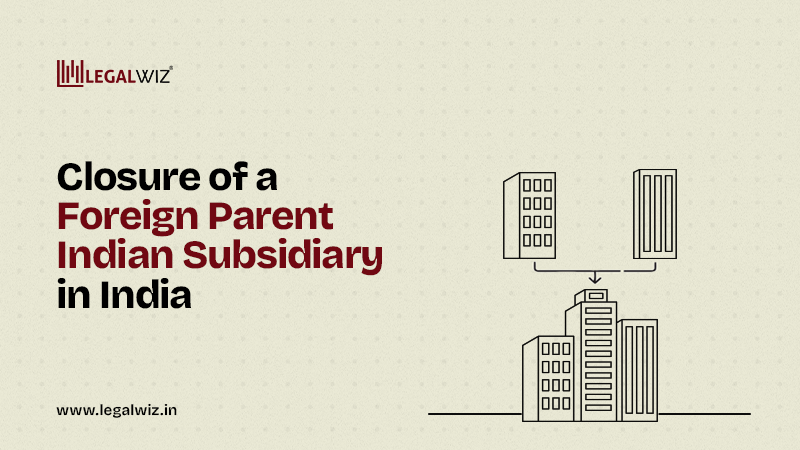Voluntary Closure of a Foreign Parent Indian Subsidiary in India: A Comprehensive Guide
Introduction
Setting up a company in India as a subsidiary of a foreign parent is a strategic move, but what happens when it’s time to close operations? Business owners often have numerous questions about the voluntary closure process:
- Can a foreign parent company close its Indian subsidiary at will?
- What regulatory approvals are required?
- How do we ensure a compliant and smooth exit?
Closing an Indian subsidiary requires navigating multiple legal, financial, and regulatory steps, including approvals from the Ministry of Corporate Affairs (MCA), Reserve Bank of India (RBI), and Authorized Dealer (AD) banks.
In this blog, we’ll break down the process into a series of key questions that every company owner faces when closing their business in India.
Is Voluntary Closure Possible Based on Management’s Decision?
Yes, a company can close voluntarily if the management decides to discontinue operations in India. However, the closure must comply with the provisions of the Companies Act, 2013, and FEMA regulations if foreign investments are involved.
Reasons for Voluntary Closure
Some common reasons for a foreign parent company deciding to close its Indian subsidiary include:
- Business restructuring or strategic exit
- Unfavorable market conditions
- Operational inefficiency or financial losses
- Compliance burdens or regulatory challenges
- Merger or acquisition by another entity
Pre-Requisites for Closure
Before initiating the closure process, the company must ensure:
- No pending statutory liabilities (Income Tax, GST, EPF, etc.).
- No outstanding creditors, loans, or employee dues.
- No ongoing litigation or regulatory disputes.
- Bank accounts closure process initiated.
- Submission of latest financial statements and audit reports.
Legal Requirements for Closure of an Indian Subsidiary
Under the Companies Act, 2013, the Registrar of Companies (RoC) has the authority to remove a company’s name from the register under specific conditions. A company may be struck off if:
- It has failed to commence business within one year of incorporation.
- It has not carried out any business operations for two consecutive financial years and has not applied for dormant company status under Section 455.
- The subscribers to the memorandum have not paid the subscription amount they committed at the time of incorporation, and a declaration regarding this has not been filed within 180 days as required under Section 10A.
- A physical verification of the registered office (under Section 12(9)) reveals that the company is not in operation.
If any of these conditions apply, the RoC may issue a notice to the company and its directors, requesting them to provide representations and relevant documents within 30 days before initiating the strike-off process.
Essential Pre-Requisites for Closing a Foreign-Owned Indian Subsidiary
Before initiating the closure process, the company must:
- Fulfil all compliance with MCA including filing of MGT 7 and AOC 4.
- Income Tax Return is filed till last year before filing for closure.
- Ensure there are no pending statutory liabilities (Income Tax, GST, EPF, etc.).
- Settle all outstanding dues, loans, and creditor payments.
- Have no ongoing litigation, regulatory investigations, or disputes.
- Close all Indian bank accounts or initiate the closure process.
- Finalize and file the last set of financial statements.
- Obtain necessary NOCs and clearances from relevant authorities.
Step-by-Step Process for Closing a Foreign Parent Indian Subsidiary
The closure of an Indian subsidiary follows the strike-off process under the Companies Act, 2013. Here’s a step-by-step breakdown:
Step 1: Board & Shareholder Approval
- The Board of Directors must pass a Board Resolution approving the closure.
- If required, a special resolution must be passed by shareholders.
Step 2: Filing Necessary Forms with the Ministry of Corporate Affairs (MCA)
- STK-2 – Application for striking off the company
- STK-3 – Indemnity bond from directors
- STK-4 – Affidavit from directors
- STK-8 – Statement of assets and liabilities certified by a practising chartered accountant
Step 3: Attach Mandatory Documents
- Indemnity Bond (STK-3) signed by directors
- Affidavit from Directors (STK-4) stating the company has no liabilities
- Bank Closure Certificate confirming all accounts have been closed
- Statement of Accounts (STK-8) prepared and certified by a Chartered Accountant
- Board Resolution & Shareholder Consent Copies
- No Objection Certificate (NOC) from Creditors and Other Regulatory Authorities
Step 4: Submit the Application & Wait for MCA Approval
- File STK-2 with the RoC (Registrar of Companies).
- The MCA will issue a public notice for objections.
- If no objections are raised, MCA will issue a strike-off order officially closing the company.
Step 5: Public Notice & MCA Approval
- MCA issues a public notice before final strike-off.
- Upon completion, the company receives a strike-off confirmation order.
Additional Approvals & Compliance before closure
- Bank Closure Certificate (To confirm no active accounts)
- NOC from Creditors and Stakeholders
- Tax Clearance Certificate (if applicable)
- GST Registration Surrender Certificate
- Surrender TAN allotted by NSDL
- Employee Provident Fund (EPF) & ESI Compliance
- Settlement of final dues with Vendors and Employees
Post-Closure Compliance & Intimations
Once the MCA issues the strike-off order, the company must:
Surrender Licenses & Registrations
- GST registration
- Import-Export Code (IEC)
- Shops & Establishment registration
- Any other industry-specific licenses taken by the company
Intimation to AD Bank (Authorized Dealer Bank) about Closure
- Submit a formal closure intimation letter to the AD Bank.
- Attach MCA strike-off order and bank closure certificate.
- AD Bank will process the request and update RBI.
Intimation to RBI
If the company had received Foreign Direct Investment (FDI), it must notify RBI through the AD Bank:
- Draft a closure letter to AD Bank requesting intimation to RBI.
- Attach the MCA strike-off order, final FLA return, and latest financial statements.
- The AD Bank updates RBI using Single Master Form (SMF) on FIRMS Portal.
- If External Commercial Borrowing (ECB) was availed, file ECB 2 Closure Report.
- Obtain closure confirmation from AD Bank.
Expected Timeline & Cost for Voluntary Closure
- Estimated Timeline: 3-6 months (subject to approvals & compliance)
- Cost: Depends on professional fees, MCA filing fees, and compliance-related expenses.
How to Repatriate Funds (If Any) Before Closure?
If the subsidiary has any remaining funds in its bank, the company must take these steps before closure:
- Transfer the remaining balance to the foreign parent after tax compliance.
- File the necessary FEMA compliance reports.
- Obtain RBI approval (if required) for repatriation.
- Close all Indian bank accounts after fund transfers.
Conclusion: Why You Need Professional Help for Seamless Closure
Closing a foreign-owned Indian subsidiary is not just about filing STK-2; it requires a well-coordinated effort involving legal, compliance, and financial expertise. Seeking professional assistance ensures compliance with all regulatory obligations and prevents unnecessary delays.
To ensure a smooth closure, companies should seek expert assistance for compliance with MCA, RBI, FEMA, and taxation laws. Legalwiz has extensive experience in handling company closures efficiently, ensuring a hassle-free exit for foreign investors from India.
Need Professional Assistance?
Get in touch with Legalwiz.in for expert guidance on company closure, regulatory compliance, and FEMA-related filings.

Labdhi Kochar
Labdhi Kochar is a legal whiz who makes startup laws sound almost fun (yes, really!). With expertise in business structuring, fundraising, and IP rights, she helps entrepreneurs turn their ideas into well-planned, legally sound ventures. Whether she’s building rock-solid business structures or simplifying compliance jargon, Labdhi believes legal knowledge should be practical and accessible. When she’s not decoding legal complexities, you’ll probably find her indulging in her true passion-shopping like it’s a full-time job!







